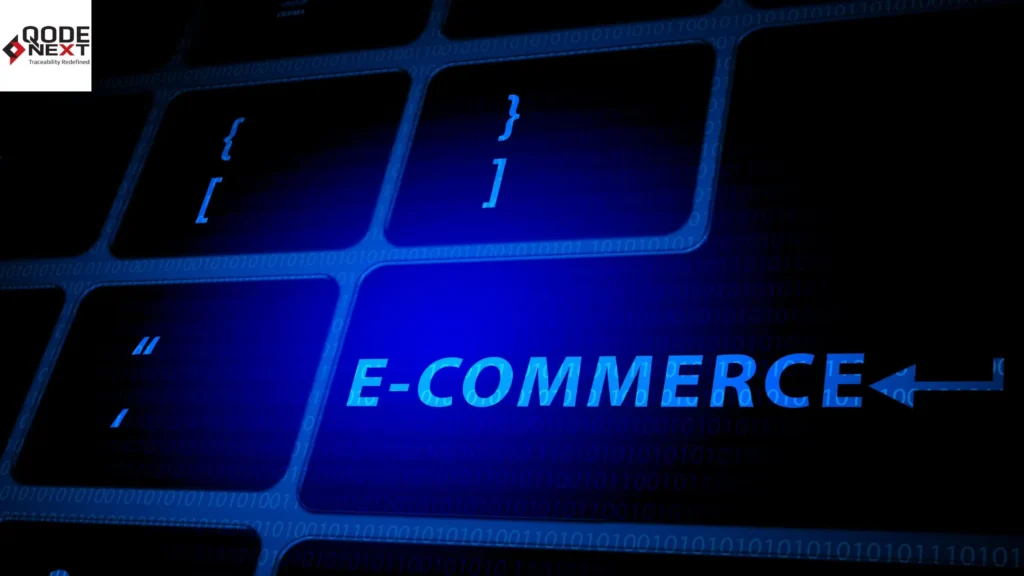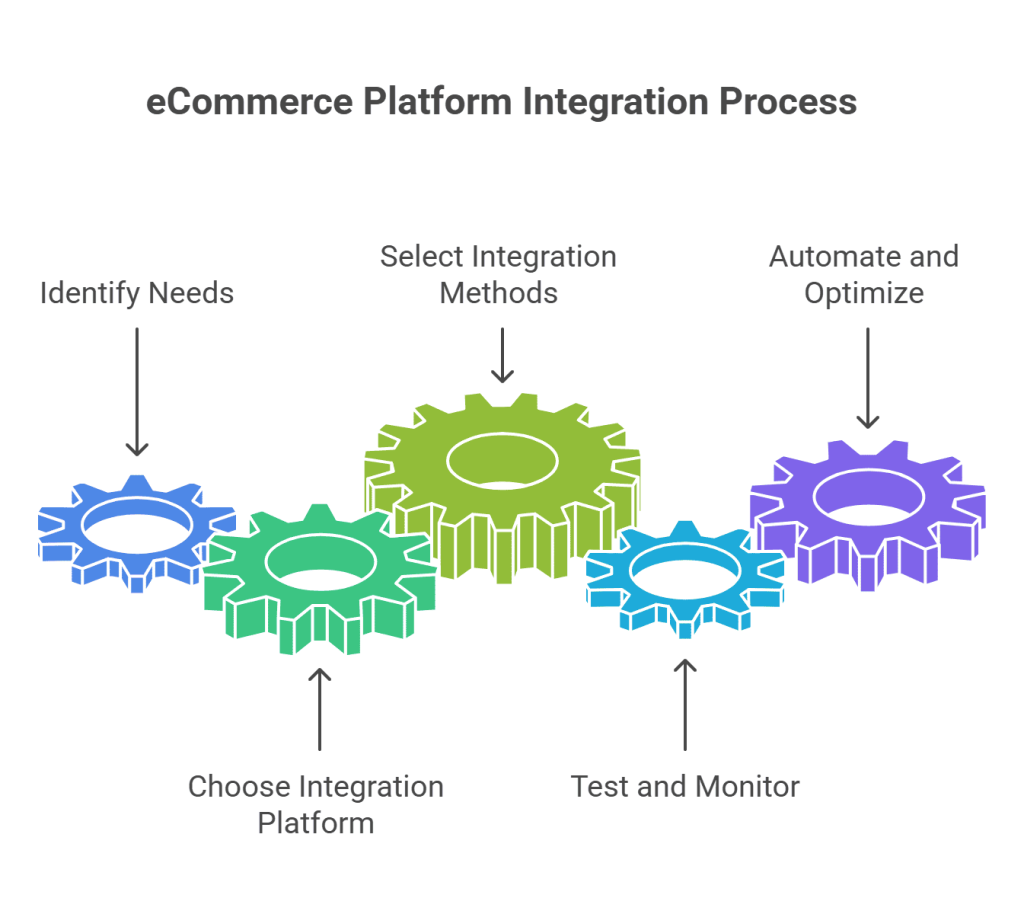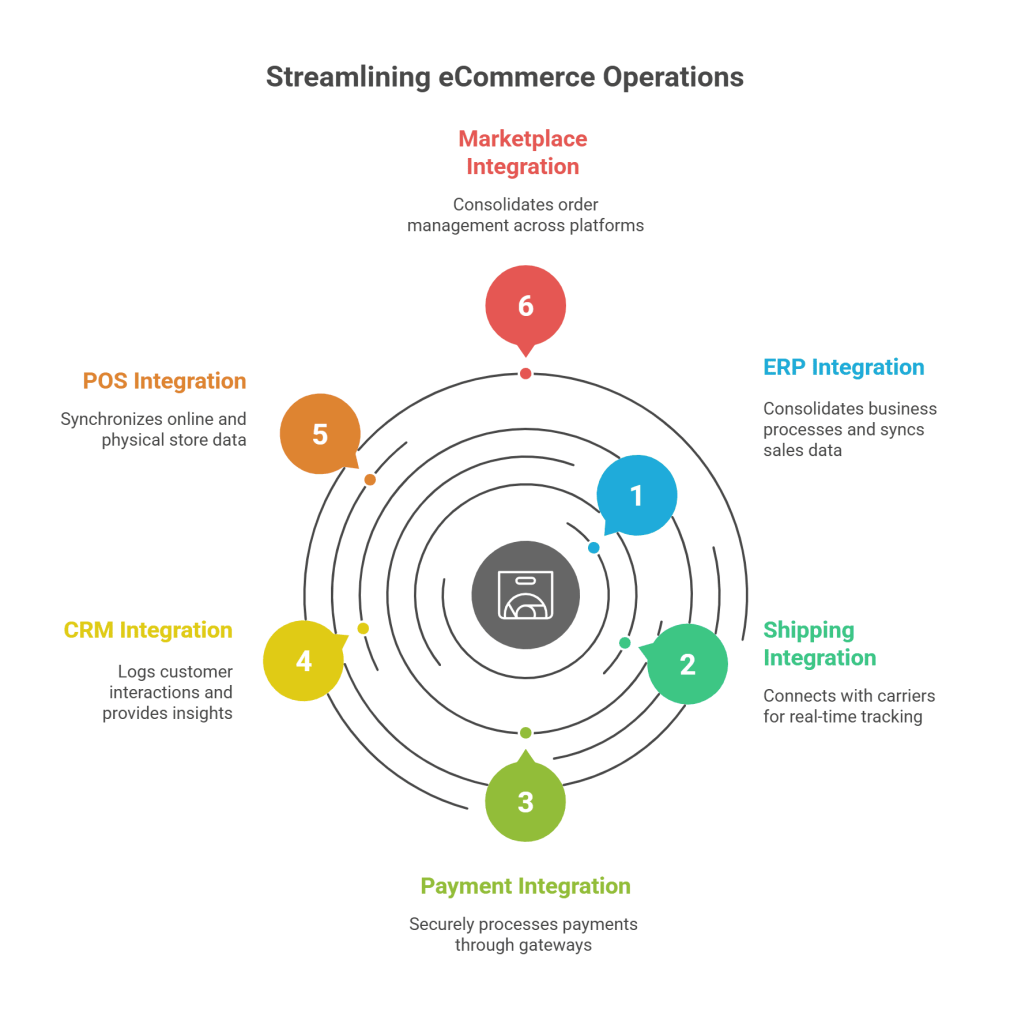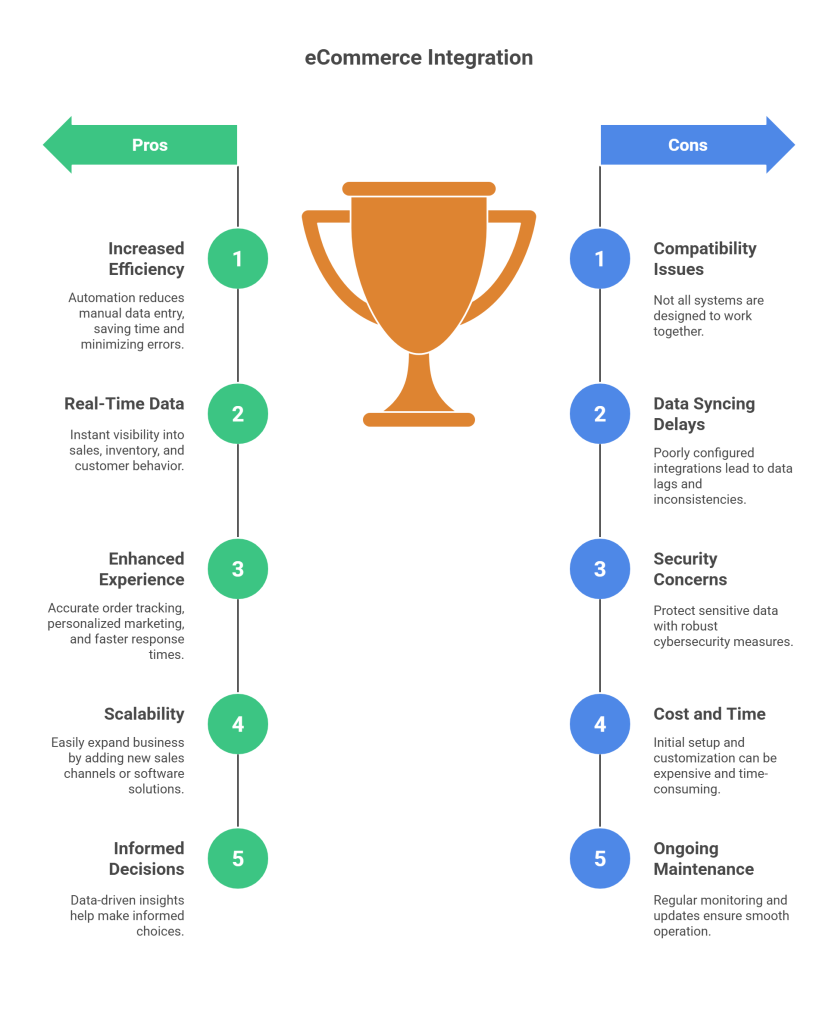Running an online store is more than just setting up a website and adding products.
To thrive in today’s competitive eCommerce landscape, you need a seamless operation that connects all aspects of your business. That’s where eCommerce integration comes in.

In this guide, we’ll cover everything you need to know about what eCommerce integration is, how to implement it, the key systems to integrate, its benefits, and the challenges you might face.
What is eCommerce Integration?
Simply put, eCommerce integration is the process of connecting your online store with other essential business systems.
This means linking your eCommerce platform to software like ERP, CRM, payment gateways, shipping providers, and inventory management systems. With a fully integrated system, data flows effortlessly between platforms, reducing manual work and ensuring accuracy.
Now that we understand what is eCommerce integration, let’s explore how you can integrate your eCommerce platform effectively.
How to Integrate Your eCommerce Platform

Integrating your eCommerce platform might sound complex, but with the right approach, it’s manageable. Here’s a step-by-step breakdown to guide you:
1. Identify Your Needs
Determine which systems need to be connected to your online store. Are you looking to manage inventory, handle payments, or automate customer relationship management?
2. Choose an eCommerce Integration Platform
Invest in reliable eCommerce integration software that supports your specific requirements.
3. Select Integration Methods
Options include API integrations, middleware solutions, or plugins that directly connect your systems.
4. Test and Monitor
Conduct thorough testing to ensure data flows accurately between systems.
5. Automate and Optimize
Once integrated, use automation to minimize manual tasks and improve efficiency.
Now that you have a clearer understanding of the integration process, let’s dive into the different systems you can connect with your eCommerce platform.
Systems to Integrate Your eCommerce Platform With

To run a streamlined online business, consider integrating your eCommerce platform with the following systems:
1. ERP Integration
Enterprise Resource Planning (ERP) systems consolidate key business processes like inventory management, accounting, and procurement. With eCommerce integration software, your sales data will automatically sync with your ERP, ensuring better decision-making and reducing errors.
2. Shipping Integration
eCommerce shipping integration allows you to connect with carriers like FedEx, UPS, or DHL. This means real-time tracking, automated shipping labels, and accurate delivery updates for your customers.
3. Payment Integration
With eCommerce payment integration, you can securely process payments through gateways like PayPal, Stripe, or Square. Offering multiple payment options increases customer satisfaction and boosts sales.
4. CRM Integration
Connecting to a Customer Relationship Management (CRM) system ensures all customer interactions are logged. eCommerce CRM integration provides valuable insights into customer behavior, enhancing your marketing efforts.
5. POS Integration
For businesses with both online and physical stores, Point of Sale (POS) integration synchronizes inventory and sales data, offering a unified view of your operations.
6. Marketplace Integration
If you sell on platforms like Amazon, eBay, or Etsy, integrating them with your store consolidates order management and inventory tracking.
Now that we’ve covered essential integrations, let’s discuss the benefits of fully integrated eCommerce platforms.
Benefits of Fully Integrated eCommerce Platforms
A well-integrated system can significantly improve your business operations. Here’s how:
- Increased Efficiency: Automation reduces manual data entry, saving time and minimizing errors.
- Real-Time Data: Gain instant visibility into sales, inventory, and customer behavior.
- Enhanced Customer Experience: Accurate order tracking, personalized marketing, and faster response times.
- Scalability: Easily expand your business by adding new sales channels or software solutions.
- Better Decision-Making: Data-driven insights help you make informed choices.
With all these advantages, it’s clear why businesses invest in eCommerce integration platforms. However, challenges can arise during implementation.

Challenges of eCommerce Integration
While integration offers immense benefits, you might face these common challenges:
- Compatibility Issues: Not all systems are designed to work together. Selecting compatible software is crucial.
- Data Syncing Delays: Poorly configured integrations can lead to data lags and inconsistencies.
- Security Concerns: Protect sensitive data with robust cybersecurity measures.
- Cost and Time: Initial setup and customization can be expensive and time-consuming.
- Ongoing Maintenance: Regular monitoring and updates are necessary to ensure smooth operation.
Despite these challenges, with careful planning and the right eCommerce integration software, you can overcome them.
FAQs : eCommerce Integration Guide: Connect Your Business for Success
1. How long does it take to integrate an eCommerce platform?
The time varies based on the complexity of your systems. Basic integrations can take a few days, while complex setups may take weeks.
2. Can I integrate multiple platforms at once?
Yes! Many eCommerce integration platforms allow you to connect multiple systems simultaneously.
3. What is the cost of eCommerce integration?
Costs depend on the software you choose, the number of integrations, and any customizations required. Expect to pay anywhere from a few hundred to several thousand dollars.
4. Do I need technical expertise to integrate my systems?
Not necessarily. Many platforms offer no-code or low-code solutions, making integration accessible for non-technical users.
5. What if my business outgrows its current integrations?
Most eCommerce integration software is scalable, allowing you to add more systems as your business grows.
Conclusion
eCommerce integration is a game-changer for online businesses, offering efficiency, accuracy, and better customer experiences. By connecting your eCommerce platform to essential systems like ERP, CRM, and shipping solutions, you’ll unlock new opportunities for growth and streamline operations.
If you’re ready to take your eCommerce business to the next level, investing in a reliable eCommerce integration platform is the way to go.
Start small, evaluate your needs, and gradually build a fully integrated system tailored to your business. Happy selling!






